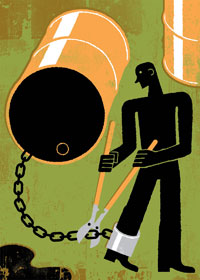sierraclub.org - sierra magazine - july/august 2012 - symptom and disease
SYMPTOM AND DISEASE
How to treat high gas prices
By Michael Brune
 Photo by Lori Eanes
Photo by Lori Eanes
Whenever I hear someone complain about high gasoline prices and, in the same breath, declare that we need more drilling, I remind myself that it's hard to find the right solution if you don't understand what's causing the problem.
Prior to 1982, for example, no one knew what caused the gastric ulcer. Sufferers were told to avoid spicy foods and take useless antacids. Bacteria were ruled out because conventional wisdom held that they couldn't survive in the human stomach. Then Australian doctors Barry J. Marshall and J. Robin Warren discovered that ulcers were, in fact, caused by Helicobacter pylori and could be successfully treated with antibiotics.
 Illustration by Timothy Cook
Illustration by Timothy Cook
High gas prices can be another pain in the gut. If driving a gasoline-powered car is the only way you can get to your job, the grocery store, or your kids' school, you're stuck paying whatever price is posted at the pump. In response to public outcry, politicians in thrall to Big Oil are trying to sell us the wrong solution: They're calling for unrestricted drilling off all our coastlines, in the Arctic, and on environmentally sensitive public lands.
That kind of prescription won't even treat our symptoms, let alone the underlying illness. What we pay per gallon of gas is determined by oil prices set on the global market. Despite what anyone tries to tell you, that price is beyond the control of Congress, the president, and even individual oil companies. The United States simply does not have enough oil in the ground to significantly lower world oil prices. Case in point: Domestic oil production in February was at an eight-year peak, but gas prices went up anyway.
Our unhealthy dependence on oil forces us to shell out for gas regardless of the price.
More drilling will achieve one thing, however, and that's bigger profits for oil companies at the expense of people and the environment. The more we drill offshore and in sensitive wilderness areas, the more oil catastrophes we and our children will have to endure. If drilling is allowed on the coastal plain of the Arctic National Wildlife Refuge, we will lose one of our planet's last untouched wildlands. And are we willing to risk a BP-style blowout off the California coast? Do we really want to risk that just so an oil company can enjoy a few more glowing annual reports?
High gas prices are a symptom. But the disease is not a lack of oil; it's our addiction to it. Our unhealthy dependence on oil forces us to shell out for gas regardless of the price. Like dope dealers, Big Oil depends on keeping us hooked. And it's betting that will be the case for decades to come.
I think Big Oil is going to lose that bet. Thanks to changing driving habits and more-economical cars, we're already using less gas. And doubling the average vehicle's fuel economy to 54.5 miles per gallon by 2025, as the EPA proposes, will save us 2.2 million barrels of oil a day, or $1.7 trillion at the pump. Better yet, young people are driving 23 percent fewer vehicle miles than their counterparts were a decade ago and using public transportation 40 percent more often. If we invested in better transit options, like high-speed rail, light rail, and bike paths, we could prevent a lot more folks from being stuck behind the wheel.
Another hopeful trend: As we develop clean-energy resources like solar and wind, more of us will be able to drive without burning any fossil fuels at all. This spring, Los Angeles became the first major American city to approve a rooftop-solar program that will let owners of apartments and warehouses sell their excess solar electricity back to the local utility. That incentive alone will create enough new solar power to charge thousands of vehicles.
This is how we treat high gas prices—not by deepening our addiction to oil, but by kicking it. And it won't hurt a bit.
Michael Brune is the executive director of the Sierra Club. You can e-mail him at michael.brune@sierraclub.org and follow him on Twitter and Facebook.
This article has been corrected.